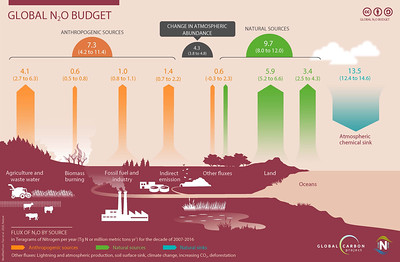Rising anthropogenic nitrous oxide emissions are jeopardizing climate goals and the Paris Accord, a study published in Nature and led by an Auburn University researcher has found.
The significant use of nitrogen fertilizers in the production of food worldwide is increasing concentrations of nitrous oxide in the atmosphere—a greenhouse gas 300 times more potent than carbon dioxide—which remains in the atmosphere longer than a human lifetime.
This finding is part of a study co-led by Professor Hanqin Tian, director of the International Center for Climate and Global Change Research at Auburn University’s School of Forestry and Wildlife Sciences and an Andrew Carnegie Fellow. The study was published today in Nature, the world’s most highly cited interdisciplinary science journal.
Tian co-led an international consortium of scientists from 48 research institutions in 14 countries under the umbrella of the Global Carbon Project and the International Nitrogen Initiative. The objective of the study, titled “A comprehensive quantification of global nitrous oxide sources and sinks,” was to produce the most comprehensive assessment to date of all sources and sinks of the potent greenhouse gas nitrous oxide.
Tian’s Auburn colleagues including Professor Shufen Pan, postdoctoral fellows Rongting Xu, Hao Shi and Yuanzhi Yao and graduate student Naiqing Pan served as co-authors among an international research team of 57 scientists.
The study points to an alarming trend affecting climate change: Nitrous oxide has risen 20 percent from pre-industrial levels, and its growth has accelerated over recent decades due to emissions from various human activities.
“The dominant driver of the increase in atmospheric nitrous oxide comes from agriculture, and the growing demand for food and feed for animals will further increase global nitrous oxide emissions,” Tian said. “There is a conflict between the way we are feeding people and stabilizing the climate.”
The researchers further identify an emerging cause of increased atmospheric nitrous oxide coming from the interaction between global warming and nitrogen additions for food production further enhancing emissions from agriculture. Warmer temperatures tend to increase nitrous oxide emissions.
The study also determined that the largest contributors to global nitrous oxide emissions come from East Asia, South Asia, Africa and South America.
Emissions from synthetic fertilizers dominate releases in China, India and the U.S., while emissions from the application of livestock manure as fertilizer dominates releases in Africa and South America, the study found. The highest growth rates in emissions are found in emerging economies, particularly Brazil, China and India, where crop production and livestock numbers have increased.
The co-authors agreed that the most surprising result of the study was the finding that current trends in nitrous oxide emissions are not compatible with pathways consistent to achieve the climate goals of the Paris Climate Agreement, or the Paris Accord.
Signed by 195 nations, the agreement aims to strengthen the global response to the threat of climate change by keeping a global temperature rise in the 21st century well below 2 degrees Celsius above pre-industrial levels, and to pursue efforts to limit the temperature rise even further, to 1.5 degrees Celsius.
“Current emissions are on track to cause global temperature increases above 3 degrees Celsius by the end of this century, twice the temperature target of the Paris Accord,” said Robert Jackson, a professor and coauthor from Stanford University and chair of the Global Carbon Project.
However, opportunities to reduce nitrous oxide emissions do exist, said Wilfried Winiwarter, a senior research scholar with the International Institute of Applied Systems Analysis in Austria and former director of the International Nitrogen Initiative and its European center.
“Europe is the only region in the world that has successfully reduced nitrous oxide emissions over the past two decades,” Winiwarter said. “Industrial and agricultural policies to reduce greenhouse gases and air pollution and to optimize fertilizer use efficiencies have proven to be effective. Still, further efforts will be required, in Europe as well as globally.”
Rona Thompson, a senior scientist from the Norwegian Institute for Air Research, was another study co-leader.
“This study shows that we now have a comprehensive understanding of the nitrous oxide budget, including climate impacts,” Thompson said. “We are able to assess and quantify measures to reduce nitrous oxide emissions, and many of these measures will also improve water and air quality, benefiting both human health and ecosystems.”
Study co-leader Josep “Pep” Canadell, chief scientist in the Climate Science Center at the Australia-based Commonwealth Scientific and Industrial Research Organisation and executive director of the Global Carbon Project, agreed the research is significant and urgent.
“This new analysis calls for a full-scale rethink in the ways we use and abuse nitrogen fertilizers globally and urges us to adopt more sustainable practices in the way we produce food, including the reduction of food waste,” Canadell said. “These findings underscore the urgency and opportunities to mitigate nitrous oxide emissions worldwide to avoid the worst of climate impacts.”
Francesco Tubiello, a senior statistician and team leader for Agri-Environmental Statistics in the Food and Agriculture Organization of the United Nations, added, “Many of the actions to improve nitrogen use efficiency and improve crop and livestock productivity, required now to begin reducing these emissions, are also needed to achieve sustainable and productive agriculture under the United Nation’s 2030 Agenda for Sustainable Development Goals.”
(Written by Teri Greene)











